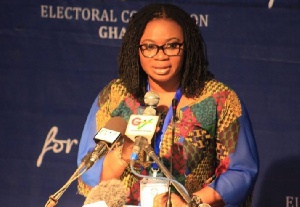 Chairperson of the EC, Ms Charlotte Osei
Chairperson of the EC, Ms Charlotte Osei
The National Democratic Congress is advocating for a guideline detailing persons who qualify to be part of the Registration Review Committees that would hear the cases of those whose eligibility were challenged in the voter’s registration.
Director of Elections of the party, Samuel Ofosu Ampofo, says there is currently no such guideline, noting this could expose the Electoral Commission to legal battles with persons who may be disqualified by the Committees.
Speaking on Onua FM’s Yen Sempa Wednesday, Mr Ampofo underscored the need for the EC to come out clear and state in the guideline, “step-by-step” who qualify to serve on the Committees in order to forestall legal suits against it.
A total of 18,986 people who registered in the just ended limited voter’s registration exercise had their eligibility challenged nationwide on various grounds.
Those who were challenged had their voter’s identity card retained by the officials of the Electoral Commission at the various district offices across the country until the determination of their cases.
The Ashanti Region recorded the highest number of people who were challenged with 5,084 while the Upper West had 246, the lowest number of cases.
The Greater Accra recorded 15,000 cases, and already, the various District Registration Review Committees have begun hearing the challenge cases.
The committees are to determine the eligibility of those who were challenged, and if found to be eligible, their voter’s identity cards released to them to enable them vote in the November 7 general elections.
The committees are made up of representatives of the various political parties, religious and traditional leaders as well as the security agencies and judges.
Mr. Ofosu Ampofo told the host the show, Kwame karikari that the some party agents during the registration exercise, connived with others to either accept or reject a voter they viewed as ineligible, something he said is not good for the process.
He said there should be a clear reason for the challenge, adding, “numerous challenges on the exercise show mistrusts in the system”.
Continuous registration
Mr Ofosu Ampofo said the continuous registration being considered by the Electoral Commission to register people once they turn 18 years, will have both financial and human resource stress on the political parties.
“The difficulty is that political parties, if they want to observe the continuous registration, must have all representatives in all the EC offices across the country the whole year and that is serious,” he argued.
He added “that will put pressure on the parties so we should look at the enduring system that will be good for all”.
NIA system
He thus underscored the need to find alternative to the continuous registration, and cited the National Identification system as one that can be considered, saying “we should look at the national database. That is why the National Identification System should be used because that will help”.